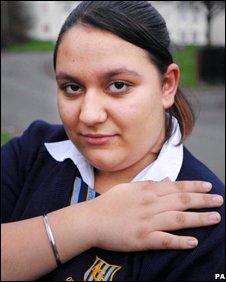Frances Gibb, Legal Editor
A 14-year-old Sikh girl has won her High Court discrimination claim against her school after it excluded her for breaking its "no jewellery" rule.
Sarika Singh, from Cwmbach, south Wales, was excluded by Aberdare Girls' School in November 2007 for refusing to take off her religious bangle. A High Court judge in London ruled on the controversial matter after reserving judgement last month.
A High Court judge in London ruled on the controversial matter after reserving judgement last month.
The school said it would consider the judgement "in detail".
Sarika says the Kara bangle - a slim steel bracelet - is important to her as it is a symbol of her Sikh faith.
As a result of the judgement, Sarika is allowed to return to the school in September, wearing the Kara.
Teenager wins legal bangle battle
Her lawyers had told Mr Justice Stephen Silber that the Kara was as important to her as it was to England spin bowler Monty Panesar, who has been pictured wearing the bangle.
The judge declared the school was guilty of indirect discrimination under race relations and equality laws.
After the judgement, Sarika said: "I am overwhelmed by the outcome and it's marvellous to know that the long journey I've been on has finally come to an end.
"I'm so happy to know that no-one else will go through what me and my family have gone through and no other pupil will ever get banned from wearing their Kara again.
"I just want to say that I am a proud Welsh and Punjabi Sikh girl."
Sarika's mother, Sinita, 38, added: "We are over the moon. It is just such a relief."
Her father Satnam Singh read a statement which said: "We are very pleased with the outcome of the case but we are extremely disappointed that we had to come to the High court in the order to give our daughter the right to wear the Kara in school."
Mr Justice Silber said he had been told the Kara bangle was regarded as vital to the Sikh religion.
It denoted the "God's infinity" he said and was effectively a "handcuff to God."
The judge rejected claims by the school that the bangle, which he said was less obtrusive than some watches, could be seen as a "symbol of affluence."
He said many watches which were allowed at the school were more expensive than than the simple plain steel Kara.
School and religious symbol cases
He commented: "In this case there is very clear evidence it was not a piece of jewellery but to Sarika was, and remains, one of the defining focal symbols of being a Sikh."
He said his decision had already been made known to the school authorities, who had agreed to Sarika returning at the start of the next term in September when she will begin preparing for her GCSEs.
The judge also refused the school permission to appeal, although it can still seek permission from the Court of Appeal.
The governors and head teacher at the school said in a statement that the decision to defend their action was taken after careful consideration by all concerned, and in good faith.
"It was not taken lightly. We regret that this action became at all necessary," they said.
"We note the comments of the judge regarding the advice offered to the school.
"Should Sarika wish to return to school in September, in accordance with the judgment, she will be offered help and support to reintegrate her into the normal day-to-day life of the school." Liberty, which backed Sarika, argued the school had breached race relations, equality and human rights laws
Liberty, which backed Sarika, argued the school had breached race relations, equality and human rights laws
They said it also contravened a 25-year-old law lords' decision which allows Sikh children to wear items representing their faith, including turbans, to school.
Anna Fairclough, the Singh family's solicitor, said: "It's a shame that each generation has to fight the same battles. This battle was already fought 25 years ago and Sarika shouldn't have had to go through that again.
"Our great British traditions of religious tolerance and race equality have been rightly upheld today."
A spokesperson for Rhondda Cynon Taf council said it had been informed of the High Court's judgement in the case and it would "be working with the school's governing body to ensure Sarika Singh's continued education."
